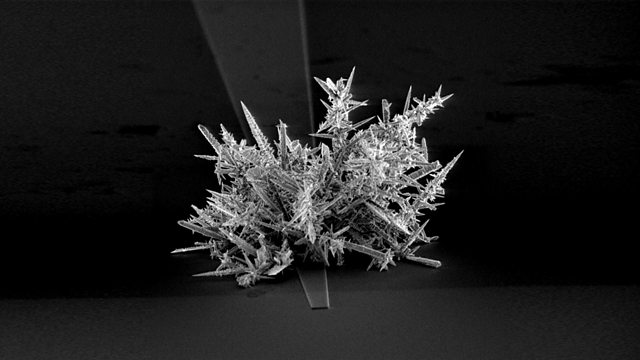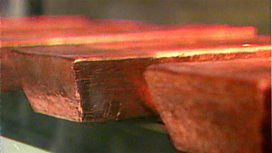Challenges of Nanoscience
New developments in biological nanosciences with Shana Kelley, Yamuna Krishnan, Benjamin Bratton and Josh Fischman.
Bridget Kendall talks to leading nanoscientists gathered by the Royal Society of Chemistry at the University of California San Diego: biochemist Shana Kelley who makes medical diagnostic tools using tiny quantities of metals, biologist Yamuna Krishnan who creates nanomachines from synthetic DNA, design theorist Benjamin Bratton who wants to link up nanoinks with cloud computing, and journalist Josh Fischman who helps us separate nanofact from nanofiction.
(Photo: A nano gold/palladium crystal courtesy of Kelley Laboratory)
Last on
![]()
Watch out: The wall is listening!
Professor Benjamin Bratton describes how nanoinks could turn whole buildings into sensors
![]()
What colour is gold when viewed on nanoscale?
Nanotech professor Shana Kelley explains why tiny particles of gold change colour.
Shana O. Kelley

Shana O. Kelley is professor of Biochemistry at the University of Toronto. Shanaβs lab has been developing electronic chips that aim to reduce the time needed for diagnosis of infectious disease and cancer to minutes, rather than days. Chip-based sensors made from nanomaterials, such as gold and palladium, play an important role, as detection sensitivity is greatly enhanced when measurements are performed at the nanoscale.Β
Yamuna Krishnan

Professor Yamuna Krishnan works at the National Centre for Biological Sciences in Bangalore, India and the University of Chicago. She makes experimental nanomachines out of filaments of DNA, and gets them to sail into the nooks and crannies of living cells. These tiny machines can be programmed to check the aspects of chemistry inside a cell which are crucial to human health.
Benjamin H. Bratton

Benjamin H. Bratton is a theorist whose work spans Philosophy, Art and Design. He is associate professor of Visual Arts and director of The Center for Design and Geopolitics at the University of California, San Diego as well as professor at The European Graduate School in Saas-Fee, Switzerland. He has worked with biosensor βinksβ, developed in UCSDβs Laboratory for Nanobioelectronics, transforming them into project Nanoskin, which explores ways to enhance the human ability to sense through our skin.
Josh Fischman

Josh Fischman is a senior editor at Scientific American magazine with special interest in health and technology. He has been following nanoscience for a number of years and explains why materials at a nanometre scale often behave in a radically different ways to macroscale. He also outlines some of the practical uses for nanotech today.
Broadcast
- Sat 4 Oct 2014 11:00ΒιΆΉΤΌΕΔ Radio 4



